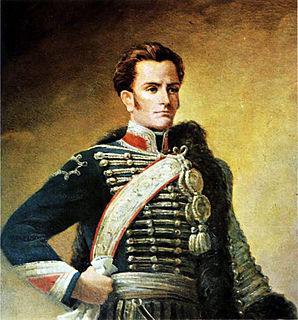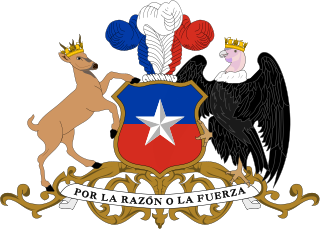
Chile's government is a representative democratic republic, whereby the President of Chile is both head of state and head of government, and of a formal multi-party system. Executive power is exercised by the president and his or her gabinet. Legislative power is vested in both the government and the two chambers of the National Congress. The judiciary is independent of the executive and the legislature of Chile. The Constitution of Chile was approved in a national plebiscite in September 1980, under the military government of Augusto Pinochet. It entered into force in March 1981. After Pinochet left power in 1988, saying this country was ready to keep going along with a plebiscite, the Constitution was amended to ease provisions for future amendments to the Constitution. In September 2005, President Ricardo Lagos signed into law several constitutional amendments passed by Congress. These include eliminating the positions of appointed senators and senators for life, granting the President authority to remove the commanders-in-chief of the armed forces, and reducing the presidential term from six to four years while also disabling immediate re-election. The Economist Intelligence Unit has rated Chile as "flawed democracy" in 2016.

The current Political Constitution of the Republic of Chile, approved by Chilean voters in a controversial plebiscite on September 11, 1980, under the military dictatorship of Augusto Pinochet, partially effective March 11, 1981, fully effective 11 March 1990 and amended considerably on August 17, 1989 and on September 22, 2005 (legislatively), and also in 1991, 1994, 1997, 1999, 2000, 2001, 2003, 2007, 2008, 2009 and 2010, replaced the earlier constitution of 1925. It is Chile's eighth constitution.

The United Mexican States is a federal republic composed of 31 states and the capital, Mexico City, an autonomous entity on par with the states.
The Huilliche, Huiliche or Huilliche-Mapuche are the southern partiality of the Mapuche macroethnic group of Chile. The Huilliche are the principal indigenous population of Chile from Toltén River to Chiloé Archipelago. According to Ricardo E. Latcham the term Huilliche started to be used in Spanish after the second founding of Valdivia in 1645, adopting the usage of the Mapuches of Araucanía for the southern Mapuche tribes. Huilliche means 'southerners'

The President of the Republic of Texas was the head of state and head of government while Texas was an independent republic between 1836 and 1845.

Chile holds nationwide presidential, parliamentary, regional and municipal elections.
An organic law is a law, or system of laws, that form the foundation of a government, corporation or any other organization's body of rules. A constitution is a particular form of organic law for a sovereign state.

The International Federation of BodyBuilding and Fitness (IFBB), headquartered in Las Rozas (Madrid), is an international professional sports governing body for bodybuilding and fitness that oversees many of the sport's major international events, notably the World and Continental Championships.
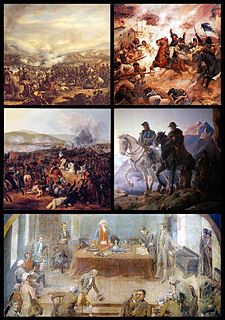
The Chilean War of Independence was a war between pro-independence Chilean criollos seeking political and economic independence from Spain and royalist criollos supporting continued allegiance to the Captaincy General of Chile and membership of the Spanish Empire.

The Football Federation of Chile is the governing body of football in Chile. It was founded June 19, 1895, making it the second oldest South American association football federation, and is a founding member of CONMEBOL in 1916. It supervises of the Chile national football team, Asociación Nacional de Fútbol Profesional: (National Association of Professional Football, originally called Asociación Central de Fútbol, or ACF, and Asociación Nacional de Fútbol Amateur.
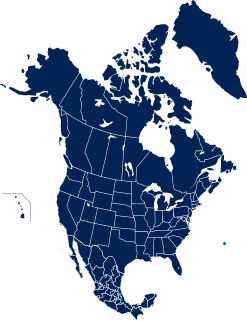
Recognition of same-sex unions is widespread in the Americas, with a majority of people in both North America and South America living in jurisdictions providing marriage rights to LGBT citizens. In North America, same-sex marriage is recognized by Canada, the United States, 13 Mexican states and Mexico City. Elsewhere in Mexico, same-sex marriages are recognized by all states, and same-sex couples may get married in any jurisdiction by obtaining a court injunction ("amparo"). Same-sex marriages are also performed in Bermuda, the Caribbean Netherlands, Greenland, and in French overseas departments. Furthermore, Aruba, Curaçao and Sint Maarten recognize same-sex marriages performed in the Netherlands, and Aruba recognizes domestic partnerships. In South America, same-sex marriage is currently legal in Argentina, Brazil, Colombia and Uruguay and is also legal in the jurisdictions of French Guiana, the Falkland Islands and South Georgia and the South Sandwich Islands, and civil unions are performed in Chile and Ecuador.

The President of Chile, officially known as the President of the Republic of Chile is the head of state and the head of government of Chile. The President is responsible for both the Chilean government and state administration. Although its role and significance has changed over the history of Chile, as well as its position and relations with other actors in the national political organization, it is one of the most prominent political figures. It is also considered as one of the institutions that make up the "Historic Constitution of Chile", and is essential to the country's political stability.

Augusto José Ramón Pinochet Ugarte was a Chilean general, politician and dictator of Chile between 1973 and 1990 who remained the Commander-in-Chief of the Chilean Army until 1998 and was also President of the Government Junta of Chile between 1973 and 1981.

A referendum on Chile's provisional constitution was held on 23 October 1818. The provisional constitution, which was successfully adopted, was written by the legislative council at Bernardo O'Higgins's request. The resulting document included 141 articles. It established a Director Supremo with an unlimited term of office who would appoint all judges, governors, offices and secretaries. The Director Supremo could also appoint five members and five alternate members in the senate. The Senate was granted some limited power to veto actions of the Director Supremo. This provisional constitution also established three provinces with governors, and specified that Catholicism was the only legal religion. This provisional document was approved, but was replaced with a permanent constitution in 1822.
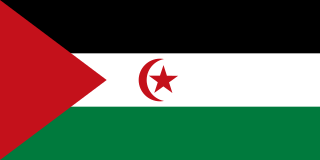
The Sahrawi Republic, officially the Sahrawi Arab Democratic Republic, is a partially recognized state that claims the non-self-governing territory of Western Sahara, but controls only the easternmost one-fifth of that territory. Until 1976, Western Sahara was known as Spanish Sahara, a Spanish colony.
The Spanish Constitution of 1869, enacted on 1 June 1869, was the sixth constitution of the constitutions of Spain to emerge from the turbulent period in Spanish history of 1814-1873.
The history of the Constitution of Chile dates from 1811. There were 10 constitutional texts and a draft for a federal organization in 1826. Its common elements are the unitary form of state and presidentialism as a form of government.
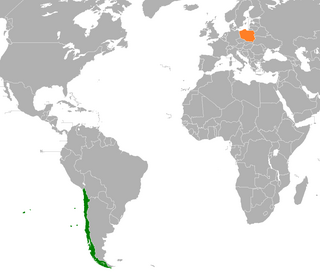
Chile–Poland relations refers to the current and historical relations between Chile and Poland. Both nations are members of the OECD.

